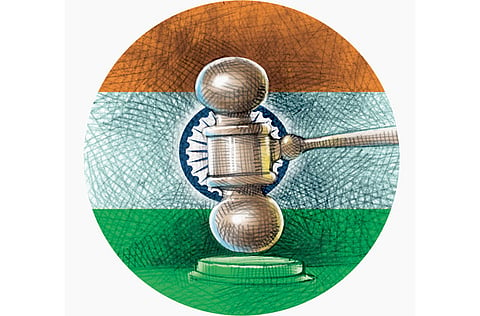Indian judiciary's reputation at stake
Supreme Court must get to the bottom of worrying claims of corruption

The judiciary is facing questions about its functioning in South East Asia. It is not only the backlog of cases which horrifies people but also the lessening integrity of judges.
The media response is wishy-washy because it is afraid of contempt proceedings. But intrepid lawyers in India, Pakistan and Bangladesh have shown that they are not hesitant to cover the ground even angels are afraid to tread on.
The Supreme Court in New Delhi has such a challenge confronting it. Two leading lawyers, Shanti Bhushan, a former law minister, and his son, Prashant Bhushan, known for his battles against human rights violations, have alleged that as many as seven retired chief justices of India, who are all alive, have received at least one favour each — something the Bhushans say needs to be scrutinised.
It all began innocuously. A few weeks ago, Prashant Bhushan said in an interview to a weekly that certain chief justices have indulged in "corrupt practices." He dared the court to try him for contempt. A senior Supreme Court lawyer, Harish Salve, urged the court to initiate contempt proceedings against Prashant. The court issued a notice.
Nothing happened for many days. Shanti Bhushan followed suit and said in the court of the chief justice that certain retired chief justices were corrupt. He submitted a sealed envelope to Chief Justice of India S.H. Kapadia. Shanti Bhushan challenged the court to institute proceedings against him for contempt of court.
Prashant has now given details of transactions which the alleged corrupt chief justices indulged in with impunity. Some of these details had been publicised earlier. I wonder what the purpose was when the judges were generally exonerated. However, the surprising part is not the repetition, but the stark silence of the Supreme Court.
A famous retired Supreme Court judge, Krishna Iyer, demanded in an article that either Shanti Bhushan and Prashant Bhushan be punished for making "false charges" or their allegations be scrutinised by an independent authority. He has, in fact, tried to expand the case by demanding a probe into the charges against other judges.
The Supreme Court has to act if it wants to salvage its prestige. It is not a political matter where the affected party does not want to retaliate even when abuses are hurled at it. This concerns the judiciary which is the custodian of the Constitution that determines the contours of governance. The court has no choice except to pick up the gauntlet thrown at it.
If the two lawyers are guilty of making frivolous or unsubstantiated charges, they must be punished. But if their charges are correct, then the public must know every detail. How I wish the country had the institution of ombudsman (Lok Pal) in position.
There is also a proposal to bring a bill on judicial accountability. Even if this is passed, it would be some time in the middle of December when the six-week winter session of parliament concludes.
One suggestion is that the matter be referred to the parliamentary standing committee on law. Parliament must realise that the judiciary is independent of both the legislative bodies and the government. So many battles have been fought by stalwarts in both the judiciary and the government as part of efforts to draw a line between the two.
It is the understanding between the two which keeps governance on an even keel. What can the parliamentary committee do? The constitution provides for impeachment of judges. But the process is so long that no judge has been impeached so far.
Cautious approach
I cannot think of a better way than appointing a 14-member tribunal comprising four sitting judges of the Supreme Court, six of the most senior chief justices from states and four from among former attorney-generals and the best lawyers in the country. The tribunal should sit like an open court. Transparency in such matters is essential.
Yet I have found that the judiciary is itself circumspect when it comes to deciding on the government's indiscretion. A few days ago, it was the Supreme Court which made a graceful gesture. It did not join issue with Prime Minister Manmohan Singh when he interpreted the court's order as interference in policy matters.
The point which the Supreme Court made — it was lost on the executive — was that the food grain was too scare a commodity to be wasted. A court appointed committee found out that 67,000 tonnes of grain in Punjab and Haryana were rotting away and being eaten by rats.
Therefore, it made sense when the court directed Sharad Pawar's agriculture ministry to give away food to the poor when it had no storage facilities. For the Prime Minister to make a statement that the court should not interfere in policy matters was a provocation which the court ignored.
Dr A.P.J. Abdul Kalam said when he was president that "In a mature democracy, it is important that judges are independent both of parliament and the government."
Judicial review is a basic feature. This was upheld in the Keshvanand Bharti case while underlining the indestructible basic structure of the constitution. It is the duty of the court to examine what the executive does. Someone once compared the government with a raging river which requires firm banks to contain it. That dyke is the judiciary.
Kuldip Nayar is a former Indian High Commissioner to the United Kingdom and a former Rajya Sabha member.
Sign up for the Daily Briefing
Get the latest news and updates straight to your inbox


